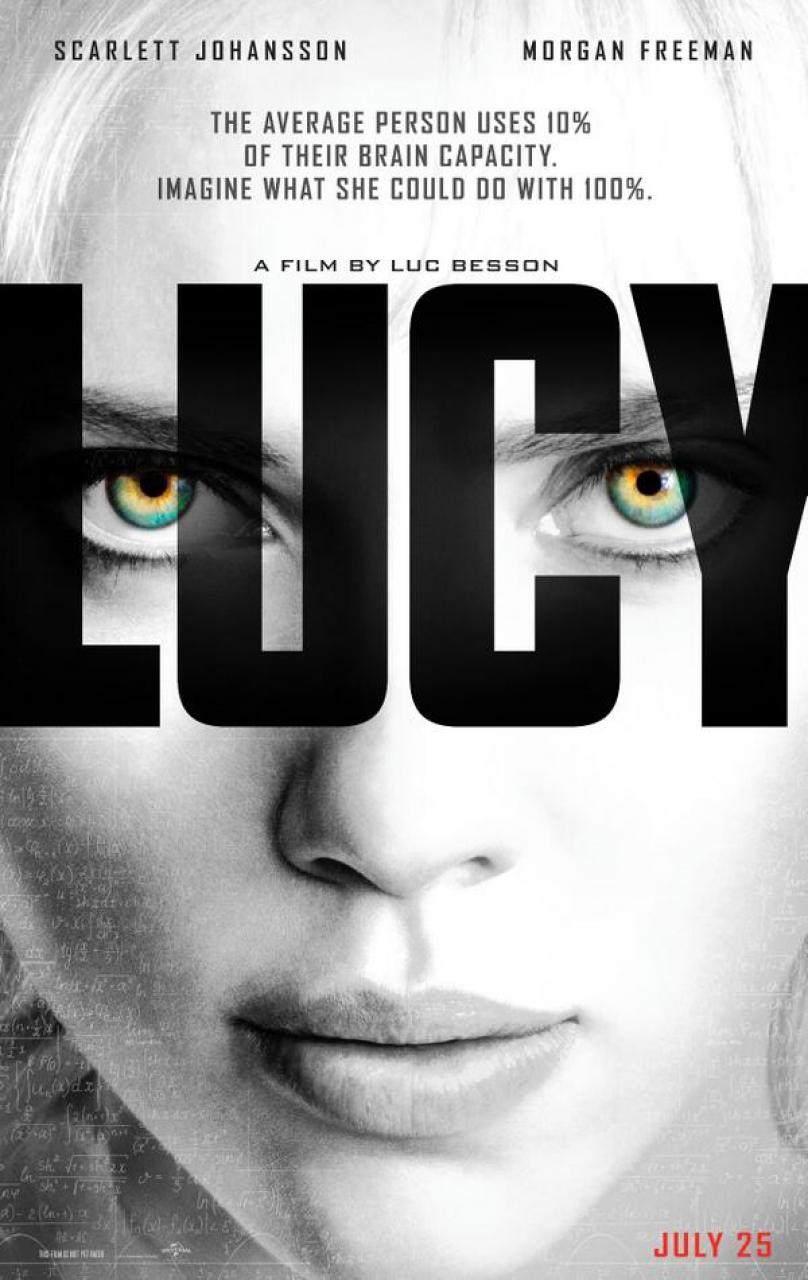 Lucy
Directed by: Luc Besson
Cast: Scarlett Johansson, Morgan Freeman, Amr Waked
Running Time: 1 hr 35 mins
Rating: R
Release Date: July 25, 2014
Lucy
Directed by: Luc Besson
Cast: Scarlett Johansson, Morgan Freeman, Amr Waked
Running Time: 1 hr 35 mins
Rating: R
Release Date: July 25, 2014
PLOT: Accidental high dosages of a mental drug cause an accidental mule (Johansson) to embark on achieving 100% full brain usage.
WHO'S IT FOR? Those who like their action movies to be trippy.
OVERALL
Lucy is unmistakably a product of writer/director/producer Luc Besson simply by its structure. It applies the same type of ticking-clock storytelling that has motivated the tension of his projects like The Transporter, Taken, and 3 Days to Kill; movies that he helped create as a writer and/or producer, but did not direct. In Besson's own take on the structure he helped fortify for others, Lucy begins with the tensity of these movies, but then it warps.
This film's transporter is Johansson's Lucy, an American living in China who is tricked by a thug boyfriend into delivering a mystery suitcase to a drug lord. Soon after the contents are revealed to her, four bags of blue crystals, Lucy is then forced to carry one of the bags inside her body as a mule to get the contents across the globe.
When she is kicked in the stomach with the contents still inside her, the crystals begin to rewire her body, and her brain capacity becomes accelerated. Meanwhile, a scientist in France (played by Morgan Freeman) explains to an academic assembly the potential of the brain, and what would happen if the human body were to use the brain more than the humble percentage of which it is of regular use.
Once the hero and her cause is established, Lucy then becomes the race of a human trying to evade murderous henchmen, while on the mental path to achieve god status. Immediately, the personal nature of this film becomes apparent to Besson, who doesn't pass this along to one of his factory workers, but keeps it for himself. He is certainly a filmmaking entity who can afford, through a multiplex-ready event, to pursue his curiosity about what it means for the human brain to be used at 100% capacity.
Aside from an extremely well-choreographed car chase that has a spooky amount of precision, Lucy finds a second serious focus in its casting. Johansson and Freeman are picked very methodically for the direction of the film, and to allow it to play out without a conflict of a character detaching the audience from the journey.
Johansson takes a character trajectory that is the direct opposite to her previous acting escapade with Under the Skin, where in this round she becomes progressively less human, and more alien. From her nightmarish beginning that introduces the drugs to her system, to a moment in which she fearfully talks on the phone to her mother before losing a human sense of memory, Johansson is a fortified force within this project. As she becomes more like an alien computer, she maintains a curiosity about her rigid ways, and doesn't degenerate her sci-fi character to total monotony despite a required flat tone in her voice.
Equally as important is the usage of Freeman, a go-to narrator for serious and silly projects alike due to the personable nature within his voice tone. Freeman helps tie Lucy's wilder parts together by delivering the symposiums that will become immediately relevant throughout the title character's journey. Having such instilled wisdom placed into this role, Freeman also assists in providing the temporary illusion that his character isn't just a lazy catchup for Besson that allows him to play around; it is one of his only attempts to explain himself to his audience.
The promise of action in Lucy is the through line that keeps this trippy film in order, with Besson taking any type of creative freedom he may please within a premise that goes beyond scientific research. As the brainpower of its title character increases, the logic of the movie is not given specific rules, but it does make for surprising scenes, and an intriguing evolution. Lucy becomes a spectacle herself, and through the care of Besson (who makes sure to give a good car chase, and some kooky action), her journey inward is actually more magentic than the simpler sci-fi action movie pleasures.
Even with such a mind-expanding premise, there is a giddy looseness within Lucy that is essential to how it must be taken; it has the free-ness of a passing experience, it is not constructed for profundities. When Besson does a dinky cover of "Beyond the Infinite" from 2001: A Space Odyssey, in the end there is not an underwhelming sense of empty wisdom. It is as playful, and maybe even happily empty, as strange inter-cuts in the beginning that pit the originally vulnerable Lucy next to images of animals being hunted.
There are many moments early into Lucy's advancement that the movie asks for the trust of its audience, that it may be silly Lucy can control electronic devices with her mind, but it's poetic, it's a giddy declaration to the magnitude of a head organ that we don't even use a quarter of. Coming from a director whose life existence does hinge on his brain power, (even if it's to make movies that do not abide reality's logic), and has a childlike vision about genre even decades after making The Fifth Element, Besson is a filmmaker to trust. To quote, of all things, the Einstein poster hanging in Mark Wahlberg's barn lab in Transformers: Age of Extinction: "Imagination is more important than knowledge."
FINAL SCORE: 7/10
